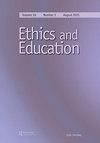Epistemic Injustice, Social Studies, and Moral Sensitivity
IF 0.7
Q3 EDUCATION & EDUCATIONAL RESEARCH
引用次数: 0
Abstract
ABSTRACT There is growing interest in epistemic injustice and its connection to education. However, the relation between social studies and epistemic injustice has not yet been adequately explored and this topic has been given insufficient attention by social studies educators. But it is regarded as an important resource for students who are socially disadvantaged to render their experiences intelligible. However, due to its unique status, it has also been an effective tool for those who are in power and want to maintain social inequalities. For that reason, social studies is the subject most likely to give rise to epistemic injustice in the classroom. In this paper, we address this issue that is currently coming to the fore in social studies. We argue that cultivating moral sensitivity plays a substantive role in overcoming epistemic injustice and this cultivation comes with shaping student’s schemas by integrating the interpretive resources into social studies.认识论不公正、社会研究与道德敏感性
人们对认知不公及其与教育的关系越来越感兴趣。然而,社会研究与认知不公之间的关系尚未得到充分的探讨,社会研究教育者对这一话题的关注也不够。但它被认为是一个重要的资源,为学生谁是社会弱势,使他们的经历理解。然而,由于其独特的地位,它也成为当权者想要维持社会不平等的有效工具。因此,社会研究是最有可能在课堂上引起认知不公正的学科。在本文中,我们讨论了这个目前在社会研究中日益突出的问题。我们认为,道德敏感性的培养在克服认知不公中起着实质性的作用,这种培养通过将解释性资源整合到社会研究中来塑造学生的图式。
本文章由计算机程序翻译,如有差异,请以英文原文为准。
求助全文
约1分钟内获得全文
求助全文

 求助内容:
求助内容: 应助结果提醒方式:
应助结果提醒方式:


